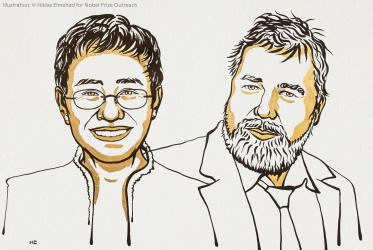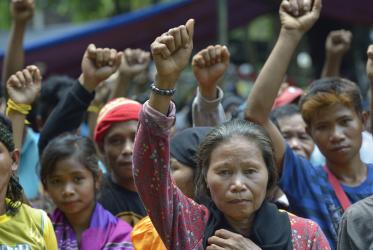“Living letters” (2 Corinthians 3:3) is a symbol of the living Church which we represent by coming together under the auspices of the World Council of Churches (WCC) and at the kind invitation of the National Council of Churches in the Philippines (NCCP).
When asked by the disciples where He lived, Jesus answered, “Come and see” (John 1:39), then He commanded John, “write down what you see and send a letter to the churches” (Revelations 1:12). Every visit is a revelation when the knower and the known become one.
This visit has been an opportunity for us to come and see: to see a culture, to see a people, to see a church, to see concerns, turmoil and hopes. First we were warmly welcomed by the general secretary of the NCCP, Rev. Rex Reyes. With hospitality and assistance from him and his colleagues:
We saw and heard the heart-breaking stories of victims of human rights abuses and their family members. We saw and felt the pain of those who have lost loved ones by extra-judicial killings, arbitrary detentions, torture and enforced disappearances.
We saw, heard and felt the pain of the farmers in Hacienda Luisita in their struggle for just labour conditions and decent livelihoods, which have been denied to them as a result of land grabbing and unfair labour practices. We call for the immediate implementation of the decisions of the Presidential Agrarian Reform Council to distribute the land to the farmers.
We saw and heard about the presence of local and foreign military personnel in Hacienda Luisita and in other parts of the country, posing a threat to the local communities. We call upon the Philippine government to repeal the Visiting Forces Agreement and withdraw all military presence from civilian communities.
We particularly saw and heard the pain, spirit and courage of the 43 health workers and their families. We question the legality of their arrest and continued detention, as do some officials of the country including the president. We strongly urge their immediate and unconditional release.
We saw, heard and rejoice in the resolve of the secretary of the Department of Justice to have the charges against the 43 health workers withdrawn by 10 December, United Nations International Human Rights Day and if not by then, at least before Christmas. We also rejoice in her recognition of the existence of a culture of impunity that has resulted in extra-judicial killings and massive human rights violations, and her resolve to put an end to it. We affirm her belief that there is no inconsistency between human rights and justice; when you serve one, you serve the other.
We saw and heard the desire of all Christian denominations, faith communities, social movements and all people of good will to unite together to recognise and promote the inherent value of life and human dignity.
We saw and heard deep hopes that the president will keep his electoral promises to put an end to impunity with regard to extrajudicial killings, disappearances and abductions, implement genuine land reform, work toward reconciliation with justice and peace, and live up to his expressed commitment to give top priority to the peace negotiations.
We write to the people of other nations to express solidarity with the Filipino people and express their concerns to the international bodies, the Philippine president, the Department of Justice and the Department of Foreign Affairs. We write to the people of the Philippines with gratitude and admiration for your courage and your hope for just and lasting peace.
May the Baby Jesus make us all Living Letters to prepare His Way by committing ourselves to prayer and action.
Glory to God and Peace on Earth.
(Luke 2:14)


